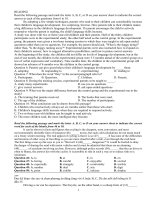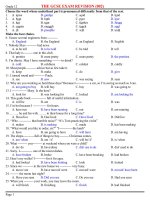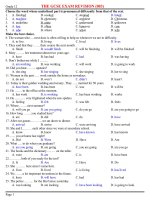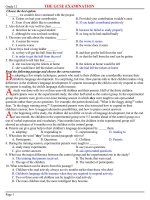GCSE 335
Bạn đang xem bản rút gọn của tài liệu. Xem và tải ngay bản đầy đủ của tài liệu tại đây (68.55 KB, 4 trang )
SƠ GD&ĐT VINH PHUC
TRƯƠNG THPT LIÊN SƠN
(Đề thi gồm: 04 trang)
ĐỀ KTCL ƠN THI THPT QUỐC GIA NĂM 20182019
Mơn: TIẾNG ANH – ĐỀ SỐ 335
Thời gian làm bài: 60 phút, không kể thời gian phát
đề
Ho va tên thi sinh:……………………………………………………………………. SBD:…………………………
Choose the word whose underlined part is pronounced differently from that of the others.
Question 01:
A. meat
B. breakfast
C. heat
D. beat
Question 02:
A. picture
B. mature
C. future
D. adventure
Choose the word that has different stress pattern from that of the others.
Question 03:
A. improve
B. farmer
C. parents
D. bumper
Question04:
A. gymnastic
B. adjective
C. difference
D. frequently
Mark the letter A, B, C or D on your answer sheet to indicate the word that is closest in
meaning to the underlined part in each of the following questions.
Question 05: He makes money by raising poultry and cattle.
A. spends
B. produces
C. earns
D. creates
Question 06: She was born and grown up in a picturesque fishing village in Ha Long Bay.
A. dangerous
B. pretty
C. wealthy
D. poor
Mark the letter A, B, C or D on your answer sheet to indicate the word that is opposite in
meaning to the underlined part in each of the following questions.
Question 07: A calculating machine can do calculations with lightning speed.
A. very quickly
B. incorrectly
C. perfectly
D. very slowly
Question 08: Many people oppose corporal punishment when educating young children though
several of them are naughty.
A. appreciate
B. agree with
C. are in favor of
D. disapprove of
Choose the word or phrase among A, B, C or D that best fits the blank space in the following
passage from 9 to 13
Every child in Great Britain between the age of five and fifteen must (09)________ school.
There (10)________ three main types of educational institutions: primary (elementary) schools,
secondary schools and universities.
State schools are free, and attendance is compulsory. Morning school begins at nine o’clock
and lasts until half past four. School is open five days a week.
(11)________ Saturdays and Sundays there are no lessons. There are holidays at Christmas,
Easter and in summer. In London as in all cities there are two grades of state schools for those
(12)________ will go to work at fifteen: primary schools for boys and girls between the ages of five
and eleven, and secondary schools for children from eleven to fifteen years.
The lessons are reading, writing, the English language, English literature, English history,
geography, (13)________, nature study, drawing, painting, singing, woodwork and drill.
Question 09:
A. attend
B. come
C. arrive
D. go
Question 10:
A. have
B. has
C. are
D. is
Question 11:
A. On
B. At
C. For
D. In
Question 12:
A. when
B. where
C. which
D. who
Question 13:
A. scientist
B. scientifically C. science
D. scientific
Mark the letter A, B, C, or D on your answer sheet to indicate the underlined part that
needs correction.
Question 14: Helen Killer, who was both blind and deafness, overcame her inabilities with the help
of her teacher, Ann Sulivan.
A. who
B. blind
C. deafness
D. inabilities
Question 15: Education, whether it happens at school or anywhere else, is a important part in our
life. A. Education
B. whether
C. or
D. a important part
Question 16: I can’t go out tonight because I have too many work to do.
A. can’t
B. because
C. too many
D. to do
Mark the letter A, B, C or D on your answer sheet to indicate the correct one to complete
each of the following sentences.
Question 17: A personal communicator helps you to________ with other computers and with people
around the world.
A. demonstrate
B. interact
C. content
D. transmit
Question 18: Peter: “Ann is in hospital.” Mary: “Yes, I know. ________ her tommorrow.”
A. I visit
B. I’ll visit
C. I’m going to visit D. I am visiting
Question 19: The children have every reason to be proud________ their efforts.
A. at
B. to
C. in
D. of
Question 20: As a famous person________ many children admire, it is important for her to act
responsibly.
A. whose
B. which
C. when
D. whom
Question 21: A number of students________ for a rise since last year
A. ask
B. have asked
C. has asked
D. asked
Question 22: Our flight was delayed, but we finally________ shortly after midnight.
A. took on
B. put off
C. took up
D. took off
Question 23: I remember________ the letter a few days before going on holiday.
A. received
B. to have received
C. to receive
D. receiving
Question 24: Ba and his family had________ to their home village.
A. a two-day trip
B. a two-days trip
C. a two-day trips
D. two-day trips
Question 25: The film________ by the time we________ to the cinema.
A. had already started/got
B. already started/ had gotten
C. had already started/had gotten
D. has already started/ got
Question 26: The teacher________ her to improve her drawing.
A. persisted
B. insisted
C. encouraged
D. made
Question 27: I have been fascinated by________ since I was at secondary school.
A. photographer
B. photography
C. photograph
D. photographic
Question 28: My parents________ tommorrow to stay with me for a few days.
A. came
B. have come
C. come
D. are coming
Mark the letter A, B, C or D on your answer sheet to indicate the sentence that is closest in
meaning to each of the following sentences.
Question 29: Jane finds it difficult to drive on the left.
A. Jane is used to drive on the left.
B. Jane is not used to drive on the left.
C. Jane is not used to driving on the left. D. It’s difficult for Jane to driving on the left.
Question 30: No one has told me about the change of plan.
A. I have not been told about the change of plan.
B. I have not told about the change of plan.
C. The change of plan has been told about.
D. I have been told about the change of plan.
Question 31: We last went to cinema two months ago.
A. We have been to the cinema for two months.
B. We haven’t been to the cinema for two months.
C. We didn’t want to go to the cinema anymore.
D. We didn’t go to the cinema for two months.
Mark the letter A, B, C or D on your answer sheet to indicate the sentence that best
combines each pair of sentences in the following questions
Question 32: Computer is a miraculous device. It is capable of doing almost anything you ask it to.
A. Computer can’t do anything you ask it to because it is a miraculous device.
B. Computer is unable to do almost anything you ask it to so it is a miraculous device.
C. Computer is a miraculous device since it is possible for doing anything you ask it to.
D. Computer is a miraculous device because it is impossible for doing almost anything you
ask it to.
Question 33: The house is very beautiful. Its gate was painted blue.
A. The house, which is very beautiful, was painted blue.
B. The house, the gate of whom was painted blue, is very beautiful.
C. The house, the gate of which was painted blue, is very beautiful.
D. The house, the gate of that was painted blue, is very beautiful.
Mark the letter A, B, C or D on your answer sheet to indicate the most suitable response
complete each of the following exchanges.
Question 34: Which expression is used to start a conversation?
A. Well, it’s been nice meeting you
B. How’s everything at school?
C. Catch you later.
D. Sorry, I’ve got to go. Talk to you later.
Question 35: - Hoa: “Are you going to buy a new computer or just continue using the old one?”
- Mary: “___________”
A. Neither. I’m going to lease one.
B. That’s impossible. I can’t afford a new one
C. Yes, I’d like one. Thank you.
D. Yes, I am.
Read the following passage and mark the letter A, B, C, or D on your answer sheet to
indicate the correct answer to each of the questions.
Most Americans look forward to their vacation. Most American employees receive an
annual vacation with pay, and it is traditional to use this time off for travel.
Travelling within the United States is very popular because foreign travel generally takes
more time and money. Every year about thirteen million people travel abroad. The most popular
periods are during the summer and the two-week school break on Christmas and New Year
holidays. These periods are also the most crowded and the most expensive time to travel, so
people who can adjust their schedules sometimes choose to travel in the autumn.
American tourists often travel by car. Most families own a car, and those who do not have a
car can rent one. Cars are usually the most economical way to travel, especially for families. It is
also fairly fast and convenient. Exellent highway with motels and restaurants nearby connect the
nation’s major cities. They enable tourists to travel at a speed of 55 to 66 miles an hour. Tourists
that want to travel faster often fly to their destination and then rent a car when they get there.
Question 36: According to the writer________.
A. Americans have no vacations.
B. Americans do not like travel.
C. it is impossible to have a day-off in the USA.
D. most Americans are fond of travelling.
Question 37: How many people travel abroad every year?
A. 13 million people
B. 66 million people
C. 30 million people
D. 55 million people
Question 38: Which of the following is not mentioned in the text?
A. Travelling on Christmas and New Year holidays take much money.
B. Most American employees use their vacation to travel every year.
C. Most families use cars as an economical way to travel.
D. American people always choose to travel in autumn
Question 39: There are many people travelling________.
A. in the winter
B. on Women’s Day
C. on Christmas and New Year
D. on Thanksgiving
Question 40: _______ are the most popular means of transport in the USA.
A. Buses
B. Cars
C. Ships
D. Planes
Question 41: The word “It” in line 8 refers to________.
A. destination
B. restaurant
C. vacation
D. car
Question 42: In the USA, __________.
A. the high ways are not in good condition.
B. tourists cannot rent a car
C. there are not any highways.
D. along the highways there are motels and restaurants available for tourists.
Read the following passage and mark the letter A, B, C, or D on your answer sheet to
indicate the correct answer to each of the questions.
The New York Times is a daily newspaper published in New York City. For a long time, it
has been a newspaper of record in the United State and one of the world’s great newspapers. Its
strength is in its editorial excellence; it has never been the largest newspaper in terms of
circulation.
The Times was established in 1851 as a penny paper whose editors wanted to report the news in
a restrained and objective fashion. It enjoyed early success as its editors set a pattern for the
future by appealing to a cultured, intellectual readership instead of a mass audience. However, in
the late nineteenth century, it came into competition with more popular, colorful, if not lurid,
newspapers in New York City. Their publishers ran sensational stories, not because they were
true, but because they sold newspapers. Despite price increases, the time was losing £1,000 a
week when Adolph Simon Ochs bought it in 1896.
Ochs built the Times into an internationally respected daily. He hired Carr Van Anda as
editor. Van Anda placed greater stress than ever on full reporting of the news of the day, and his
reporters maintained and emphasized existing good coverage of international news. The
management of the paper decided to eliminate fiction from the paper, added a Sunday magazine
section, and reduced the paper’s price back to a penny. In April 1912, the paper took many risks to
report every aspect of the sinking of the Titanic. This greatly enhanced its prestige, and in its
coverage of two world wars, the Times continued to enhance its reputation for excellence in world
news.
In 1971, the Times was given a copy of the so-called “Pentagon Papers,” a secret
government study of U.S. involvement in the Vietnam war. When it published the report, it became
involved in several lawsuits. The U.S. Supreme Court found that the publication was protected by
the freedom-of-the-press clause in the First Amendment of the U.S Constitution. Later in the
1970s, the paper, under Adolph Ochs’s grandson, Arthur Ochs Sulzberger, introduced sweeping
changes in the organization of the newspaper and its staff and brought out a national edition
transmitted by satellite to regional printing plants.
Question 43: Which phrase is closest in meaning to the word “restrained” in paragraph 1?
A. Put in prison
B. In handcuffs
C. Without educationD. With self-control
Question 44: What word or phrase does the word “his” in paragraph 2 refer to?
A. Van Anda
B. Reporters
C. News of the day D. International news
Question 45: According to the passage, the Times has a national edition that is__________
A. protected by the Supreme Court.
B. printed in the form of a Sunday magazine.
C. shipped by train and air transport daily.
D. transmitted by satellite to regional printing plants.
Question 46: What word or phrase does the word “publication” in paragraph 3 refer to?
A. The Times
B. “The pentagon Papers” C. The Report
D. The Constitution
Question 47: What is the main idea of the passage?
A. The New York Times publishes the best fiction by American writers.
B. The New York Times became highly respected throughout the world.
C. The New York Times broadcasts its news to TV stations via satellite.
D. The New York Times lost its prestige after the Vietnam War.
Question 48: Which word or phrase is closest in meaning to the word “enhanced” in paragraph 2?
A. made the best of B. increased
C. reduced
D. made worse
Question 49: It can be inferred from the passage that the circulation of the Times is
A. not the largest in the world.
B. not the best in the world.
C. the smallest in the world.
D. the worst in the world.
Question 50: According to the passage, what caused the loss of money at the Times?
A. Other newspapers were more colorful.
B. Other newspapers had better reporters.
C. Other newspapers added a Sunday magazine.
D. Other newspapers were better managed.
_________THE END__________









